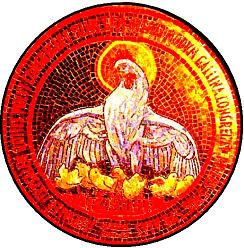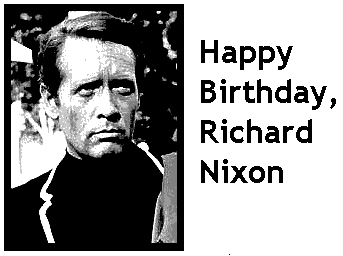My entry for New Year's Day links to a paper by Robert T. Curtis* from The Arabian Journal for Science and Engineering (King Fahd University, Dhahran, Saudi Arabia), Volume 27, Number 1A, January 2002.
From that paper:
"Combinatorially, an outer automorphism [of S6]
can exist because the number of unordered pairs of 6 letters is equal
to the number of ways in which 6 letters can be partitioned into three
pairs. Which is to say that the two conjugacy classes of odd
permutations of order 2 in S6 contain the same number of elements, namely 15. Sylvester... refers to the unordered pairs as duads and the partitions as synthemes. Certain collections of five synthemes... he refers to as synthematic totals or simply totals; each total is stabilized within S6 by a subgroup acting triply transitively on the 6 letters as PGL2(5)
acts on the projective line. If we draw a bipartite graph on (15+15)
vertices by joining each syntheme to the three duads it contains, we
obtain the famous 8-cage (a graph of valence 3 with minimal cycles of length 8)...."
Here is a way of picturing the 8-cage and a related configuration of points and lines:
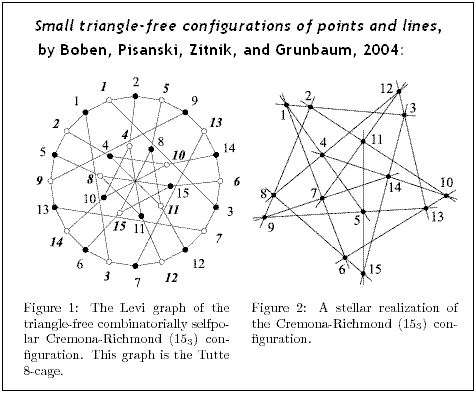
Diamond Theory shows that this structure
can also be modeled by an "inscape"
made up of subsets of a
4x4 square array:
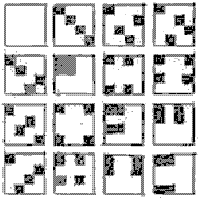
The illustration below shows how the
points and lines of the inscape may
be identified with those of the
Cremona-Richmond configuration.

Saturday, January 14, 2006 4:07 AM
(See previous entry.)
-- Brian Weatherson, Associate Professor of Philosophy, Cornell University, May 11, 2004
Here, on the other hand, is a way of framing the problem that is entirely idiosyncratic:
On this date:
Probability:
In 1970, William Feller died.
Modality:
In 1978, Kurt Gödel died.
Intersection:
In 1898, the Rev. Deacon Charles Lutwidge Dodgson died.
Friday, January 13, 2006 12:00 PM
Beyond the Fire"Who Needs a White Cube These Days?"
-- Headline in today's New York Times
"That Nature is a Heraclitean Fire..."
-- Poem title, Gerard Manley Hopkins
"... Sleep realized
Was the whiteness that is the ultimate intellect,
A diamond jubilance beyond the fire,
That gives its power to the wild-ringed eye."
-- Wallace Stevens,
"The Owl in the Sarcophagus" III 13-16,
from The Auroras of Autumn, 1950
Related material:
The five entries ending on Christmas, 2005.
Wednesday, January 11, 2006 10:30 PM
Time in the Rock"a world of selves trying to remember the self
before the idea of self is lost--
Walk with me world, upon my right hand walk,
speak to me Babel, that I may strive to assemble
of all these syllables a single word
before the purpose of speech is gone."
-- Conrad Aiken, "Prelude" (1932),
later part of "Time in the Rock,
or Preludes to Definition, XIX" (1936),
in Selected Poems, Oxford U. Press
paperback, 2003, page 156
"The rock is the habitation of the whole,
Its strength and measure, that which is near, point A
In a perspective that begins again
At B: the origin of the mango's rind.
It is the rock where tranquil must adduce
Its tranquil self, the main of things, the mind,
The starting point of the human and the end,
That in which space itself is contained, the gate
To the enclosure, day, the things illumined
By day, night and that which night illumines,
Night and its midnight-minting fragrances,
Night's hymn of the rock, as in a vivid sleep."
-- Wallace Stevens in The Rock (1954)
"Poetry is an illumination of a surface,
the movement of a self in the rock."
-- Wallace Stevens, introduction to
The Necessary Angel, 1951
Jung's Imago and Solomon's Cube.
The following may help illuminate the previous entry:
"I want, as a man of the imagination, to write poetry with all the power of a monster equal in strength to that of the monster about whom I write. I want man's imagination to be completely adequate in the face of reality."
-- Wallace Stevens, 1953 (Letters 790)
The "monster" of the previous entry is of course not Reese Witherspoon, but rather Vox Populi itself.
Wednesday, January 11, 2006 11:07 AM
BBC News today:

Reese Witherspoon
was the winner of
the leading lady award
at the People's Choice
ceremony in Los Angeles.
to be a monster chick flick,
because its design is
almost mythic...."
-- Entertainment Weekly
See the two previous entries.
Related material:
Election,
All About Eve.
Wednesday, January 11, 2006 4:09 AM
Sunday, Nov. 6, 2005:
Question:
What does Chicken Little
have in common with
The Passion of the Christ?
An anonymous commenter's answer: "The title character announces the coming of the end, suffers mockery and condemnation, and ends up saving the world through his actions."
(The "real" answer: "The music for each was composed by John Debney.")
Click on the chicken.
Related hymn:
"Till Armageddon,
no Shalam, no Shalom.
Then the father hen will
call his chickens home."
-- Johnny Cash
Tuesday, January 10, 2006 5:01 AM
(continued)
From Nov. 12, 2005:
"Follow the spiritual journey
that is BEE SEASON."

"'Tikkun Olam,
the fixing of the world,'
she whispers. 'I've been
gathering up the broken vessels
to make things whole again.'"
From Nov. 14, 2005:
| Culture Wars 'Chicken Little' Lays Golden Egg (Dean Goodman, Reuters) 'Bee Season' Anxiety (Leonard Klady, Movie City News): The mixed bag of limited release preems was highlighted by an excellent response to the concert film Sarah Silverman: Jesus is Magic. The film recorded a $19,000 plus per engagement average from seven outings for a $130,000 gross. The family drama Bee Season
had a comparable gross but on three times as many screens that
translated into anxiety about the Richard Gere film's expansion
prospects. |
Today's vocabulary lesson:

Click on the word for the definition.
A search on the related adjective "hendiadic"
leads to an insightful discussion of
religion and law
in contemporary Latin America
by Antônio Flávio Pierucci.
For other material on
Latin America and religion
from Robert Stone and
Nythamar Fernandes de Oliveira,
see the Jan. 25, 2005, entry
Diamonds Are Forever.
Related material:
Yesterday's link for Nixon's birthday
led to an obituary of a Marxist
writer that concluded as follows:
"In
2004, Mr. Magdoff wrote about his friendship with Che Guevara, one of
his revolutionary heroes. At what proved to be their final meeting
before Mr. Guevara's death in 1967, Mr. Magdoff asked what he could do
to help Cuba. 'Keep on educating me,' was the response."
I recommend the writings of
Pierucci, Stone, and Oliveira,
but not those of Magdoff.
Monday, January 9, 2006 6:01 AM
Monday, January 9, 2006 5:01 AM
-- Dean G. Hoffman, Auburn U.,
July 2001 Rutgers talk
Diagrams from Dieter Betten's 1983 proof
of the nonexistence of two orthogonal
6x6 Latin squares (i.e., a proof
of Tarry's 1900 theorem solving
Euler's 1782 problem of the 36 officers):
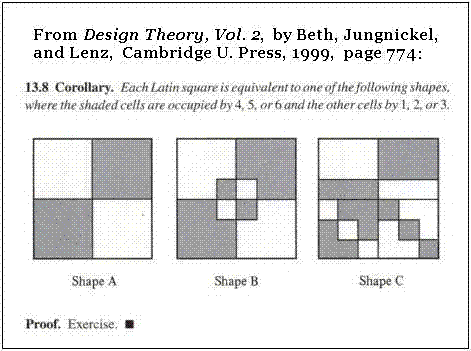
Compare with the partitions into
two 8-sets of the 4x4 Latin squares
discussed in my 1978 note (pdf).
Sunday, January 8, 2006 8:00 PM
For Stephen Hawking's BirthdayEpigraphs to the classic novel Cosmic Banditos:
God does not play dice with the universe. --Albert Einstein
Not only does God play dice with the universe, but sometimes he throws them where they cannot be seen. --Stephen Hawking
Today's Pennsylvania Lottery numbers:
| 7/22, Feast of St. Mary Magdalene. | |
| Page 399, Bartlett's Familiar Quotations of 1919. |
Saturday, January 7, 2006 11:09 PM
Strange Attractor
(See also the star as a
"spider" symbol in the
stories of Fritz Leiber.)
For Heinrich Harrer,
who died today...

Wikipedia on the north face of the Eiger:
"A portion of the upper face is called 'The White Spider,' as
snow-filled cracks radiating from an ice-field resemble the legs of a
spider. Harrer used the name for the title of his book about his
successful climb, Die Weisse Spinne (translated... as The White Spider)."
"Connoisseur of Chaos,"
by Wallace Stevens,
from Parts of a World (1942):
III
After all the pretty contrast of life and death
Proves that these opposite things partake of one,
At least that was the theory, when bishops' books
Resolved the world. We cannot go back to that.
The squirming facts exceed the squamous mind,
If one may say so . And yet relation appears,
A small relation expanding like the shade
Of a cloud on sand, a shape on the side of a hill.
V
The pensive man . . . He sees that eagle float
For which the intricate Alps are a single nest.
Related material:
- Trevanian on "the meadow" in Shibumi,
- Trevanian on "the meadow that tilts up toward the north face" in The Eiger Sanction,
- Johnny Mercer on the meadow (Dec. 18 and 20, 2005), and
- Nine is a Vine, Christmas Eve, 2005.
Friday, January 6, 2006 8:23 AM
E. L. Doctorow, author of
City of God
"In the Garden of Adding
live Even and Odd."
-- City of God

Adapted from
Ad Reinhardt
Friday, January 6, 2006 12:24 AM

-- William T. Noon, Society of Jesus,
Chapter 4 of Joyce and Aquinas,
Yale University Press, 1957
The Shining,
by Stephen King:

For more about shining,
click on the star.
Thursday, January 5, 2006 6:15 PM
| "Thus the whirligig of time brings in his revenges." |
| Twelfth Night, Act V, Sc. I [text] |
Thursday, January 5, 2006 9:00 AM

For details, see Visualizing GL(2,p).
Thursday, January 5, 2006 12:00 AM

I stood in the cold on the porch
And could not think of anything so perfect
As man's hope of light in the face of darkness.
-- Richard Eberhart,
"The Eclipse"
Wednesday, January 4, 2006 4:04 AM
In memory of Humphrey Carpenter, author of The Inklings, who attended The Dragon School. Carpenter died a year ago today.
"Lewis began with a number of haunted images...."
"The best of the books are the ones... where the allegory is at a minimum and the images just flow."
"'Everything began with images,' Lewis wrote...."

From Paul Preuss,
Broken Symmetries
(see previous entry):
From
Verbum Sat Sapienti?

Escher's Verbum

Solomon's Cube

Geometry of the I Ching
Wednesday, January 4, 2006 2:00 AM
"The Transfiguration of Christ is the culminating point of His public life.... Jesus took with him Peter and James and John and led them to a high mountain apart, where He was transfigured before their ravished eyes. St. Matthew and St. Mark express this phenomenon by the word metemorphothe, which the Vulgate renders transfiguratus est. The Synoptics explain the true meaning of the word by adding 'his face did shine as the sun: and his garments became white as snow,' according to the Vulgate, or 'as light,' according to the Greek text. This dazzling brightness which emanated from His whole Body was produced by an interior shining of His Divinity."
-- The Catholic Encyclopedia of 1912
Paul Preuss:
From Broken Symmetries, 1983, Chapter 16:
"He'd toyed with 'psi' himself.... The reason he and so many other theoretical physicists were suckers for the stuff was easy to understand-- for two-thirds of a century an enigma had rested at the heart of theoretical physics, a contradiction, a hard kernel of paradox....
Peter [Slater] had never thirsted after 'hidden variables' to explain what could not be pictured. Mathematical relationships were enough to satisfy him, mere formal relationships which existed at all times, everywhere, at once. It was a thin nectar, but he was convinced it was the nectar of the gods....
Those so-called crazy psychics were too sane, that was their problem-- they were too stubborn to admit that the universe was already more bizarre than anything they could imagine in their wildest dreams of wizardry."
Tuesday, January 3, 2006 8:06 PM

"Happy Six,"*
and Step Two --
"Then a Miracle Occurs."**
The miracle occurred on the
Feast of the Transfiguration,
August 6, 1945, at 8:15 AM
in Hiroshima, Japan.
** This Jan. 2 entry discusses Einstein as, according to the New York Times, "a moral and even spiritual sage."
Monday, January 2, 2006 12:25 PM
Then a Miracle OccursThe New York Times on Sunday,
New Year's Day, 2006,
by John Horgan--
"Einstein Has Left the Building"--
"Down the hall from my office, Albert Einstein's electric-haired visage beams from a poster for the 'World Year of Physics 2005.' The poster celebrates the centennial of the 'miraculous year' when a young patent clerk in Bern, Switzerland, revolutionized physics with five papers on relativity, quantum mechanics and thermodynamics. 'Help make 2005 another Miraculous Year!' the poster exclaims.... As 2005 wound down with no miracles in sight, the poster took on an increasingly poignant cast, like a Kerry/Edwards bumper sticker...."From a debate:
KERRY: "I'm going to be a president who believes in science."
KERRY: "I'm a Catholic - raised a Catholic. I was an altar boy. Religion has been a huge part of my life, helped lead me through a war, leads me today."
BUSH: "Trying to decipher that."
Click on "religion" in this quote to find out what Einstein really meant.
Here's a bumper sticker for Horgan:
More from Horgan's New Year's Day sermon:
"We revere [Einstein] not only as a scientific genius but also as a moral and even spiritual sage....""What you mean 'we,' blue man?"
-- The Red States
Sunday, January 1, 2006 6:00 AM


